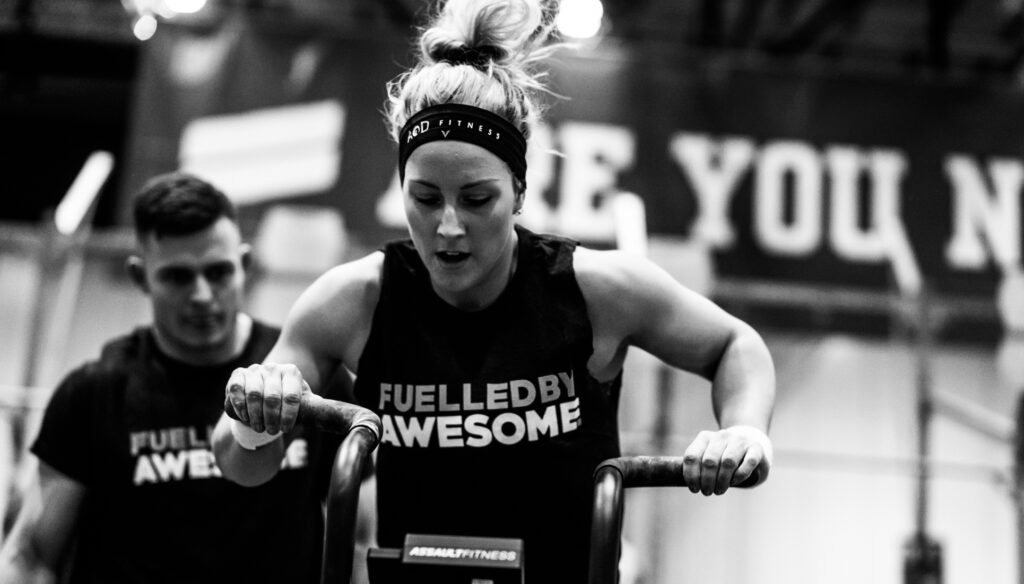A review of muscle glycogen uptake for exercise performance.
Introduction
During intense multi-event days of competition in high-intensity sports, carbohydrates are the primary fuel substrate. Muscle glycogen particles are broken down, freeing glucose molecules that muscle cells can then oxidise through anaerobic and aerobic processes to produce adenosine triphosphate (ATP) that produces muscular contractions. Muscle glycogen stores are affected mainly by exercise intensity. Therefore, even if events are not long – muscle glycogen can be severely depleted after an event.
During exercise at intensities greater than approximately 60% maximal oxygen consumption (VO2max) blood glucose and muscle glycogen are the primary fuels oxidized to produce the ATP required to sustain exercise intensity. More fast-twitch motor units are recruited as exercise intensity increases, increasing the reliance on carbohydrates as the predominant fuel source [1,2].
Carbohydrates and Performance
It has been well established that beginning exercise with ample muscle glycogen stores is an important contributor to improved exercise performance; further, restoration of glycogen stores is essential for complete recovery and the maintenance of subsequent exercise capacity [3, 4].
The glycogen content of the liver and muscles ranges from 300-700g [5] (500g average) with factors such as weight (in particular lean muscle mass) affecting an individual’s muscle glycogen store capacity.
Glycogen Synthesis After Exercise
Following intense physical activity and the reduction of muscle glycogen stores, certain physiological processes take place that metabolically prepare the muscles for rapid glycogenesis (uptake of muscle glycogen).
When carbohydrates are ingested post-exercise, insulin release from the pancreas, insulin sensitivity in muscles, glucose uptake by muscle cells, and glycogen synthase activity within muscle cells are all increased. These responses have been shown to be elevated for up to 48 hours. It has been shown that repeated intake of 1-1.2g/kg/hour bodyweight of carbohydrate after exercise takes advantage of these metabolic circumstances to stimulate high rates of glycogen synthesis [4]. When 24 hours of rest occur between exercise sessions, ingesting a total of 10g/kg BW, along with adequate calories, to maintain energy balance, will maximise glycogen restoration [4,6].
For performance in functional fitness events, whereby multiple events of near maximal intensities occur across multiple days, it would seem that a total of near 8-12g/kg BW would need to be ingested (as well as ample calories) to ensure glycogen resynthesis over a day of competition. Here follows a recommendation from [3,4].
Exercise Intensity: Very High “Very hard exercise for an hour or more or very prolonged exercise such as interval training, ice hockey, soccer, basketball, running, swimming, bicycling at an intense effort (cannot speak during the effort)”
Dietary Carbohydrate: 8 -12g/kg BW/day
Comments: Postexercise carbohydrate/protein intake, with high-carbohydrate meals and snacks, is needed to fully restore muscle glycogen within 24–36 h.
To further this, a diagram from [7] shows how the partial restoration of muscle glycogen can deplete quickly, especially during day 3 (a double training day of high intensity). This is most likely the sort of drop we could expect during competition and so it will be of paramount importance to restore muscle glycogen levels post-event, especially on a multiple-day competition.

Points of importance:
- Highlighting day 3, in which a hard double training day of high-intensity exercise leaves muscles glycogen levels below that of contractile dysfunction.
- This is where we would expect to see a decrease in performance.
- Note this graph is over multiple days. Application to competition is therefore even more important as you could be competing in up to 5 events a day.
- Also, note the supercompensation phase that occurs after a few days of light training and adequate carbohydrate intake.
Amount and Type of Dietary Carbohydrate
It was found in [4] that long term glycogen recovery (eg>24 hours) is not affected by timing or carbohydrate type but most influenced by total carbohydrate ingested. It’s also worth noting that solid and liquid forms of carbohydrates are associated with similar rates of glycogen synthesis, so athletes should meet carbohydrate needs via food/drinks they enjoy/are most familiar with.
In the hours immediately post exercise, high-glycemic index (GI) foods can speed muscle glycogen restoration. Low GI foods are digested and absorbed more slowly than high GI foods. Lower GI carbohydrate consumption causes lower blood insulin levels which are associated with greater oxidation of fatty acids during exercise and reduced degradation of muscle glycogen [7].
Higher glycemic carbohydrates have been shown to improve muscle glycogen resynthesis of over 25% extra against its lower glycemic counterpart [7].
Studies [8,9] have shown that the consumption of 10.2g/kg/BW/day (vs 6.2g/kg/BW/day) resulted in a 47% greater pre-exercise muscle glycogen values, better performance and enhanced reliance on muscle glycogen as a fuel.
Protein Consumption and Muscle Glycogen
Very significantly, consuming proteins with carbohydrates may be beneficial in stimulating rapid glycogenesis in the hours immediately following exercise [10]. A finding that is extremely relevant to functional fitness competition. For this reason all post event meals (see event guide) are recommended to have some protein to aid glycogenesis.
“The addition of protein to carbohydrate during post-exercise recovery may be beneficial under circumstances when carbohydrate ingestion is sub-optimal (≤0.8 g kg body mass) for effective restoration of muscle glycogen and repeated exercise capacity.” [7].
It’s hypothesised the increased glucose uptake and increased signalling pathways are made possible via the influx of amino acids (key signalling molecules to our DNA). Protein consumption also induces a rise in blood insulin concentration that augments the insulinemic response to carbohydrate ingestion, increasing the rate of glycogen repletion [11]. However, when carbohydrate consumption is >1.0g/kg BW/h the addition of protein doesn’t seem to further enhance glycogenesis.
However, from a practical standpoint, we know protein is an important nutrient for recovery as it stimulates protein synthesis, enhancing muscle recovery, repair and growth. Adequate protein consumption will be key to ensuring delayed onset muscle soreness (DOMS) can be as limited as possible. Sarcomere damage resulting from high intensity resistance training requires high levels of both carbohydrate and protein intake for sufficient recovery.
Therefore, consumption of 0.3-0.4g protein/kg BW soon after exercise has been shown to optimise muscle protein synthesis [12,13]. There are no negative implications associated with consuming a mixture of carbohydrates and protein; and as such many popular snacks and sports foods contain the necessary amount to stimulate muscle glycogen synthesis.
References:
[1] Carbohydrate Dependence During Prolonged, Intense Endurance Exercise.
Hawley JA, Leckey JJ, Sports Med. 2015 Nov; 45 Suppl 1():S5-12.
[2] Regulation of glucose and glycogen metabolism during and after exercise.
Jensen TE, Richter EA, J Physiol. 2012 Mar 1; 590(5):1069-76.
[3] American College of Sports Medicine Joint Position Statement. Nutrition and Athletic Performance. Thomas DT, Erdman KA, Burke LM. Med Sci Sports Exerc. 2016 Mar; 48(3):543-68.
[4] – Postexercise muscle glycogen resynthesis in humans.
Burke LM, van Loon LJC, Hawley JA. J Appl Physiol (1985). 2017 May 1; 122(5):1055-1067.
[5] – Hargreaves M. The metabolic systems: carbohydrate metabolism. In: Farrell P, ed. ACSM’s Advanced Exercise Physiology. 2nd ed.Philadelphia: Lippincott Williams & Wilkins; 2012:379–391.
[6] – Ivy JL, Goforth HW Jr, Damon BM et al. , Early postexercise muscle glycogen recovery is enhanced with a carbohydrate-protein supplement. J Appl Physiol. 2002;93:1337–1344
[7] – Murray, Bob, and Christine Rosenbloom. “Fundamentals of glycogen metabolism for coaches and athletes.” Nutrition reviews vol. 76,4 (2018): 243-259. doi:10.1093/nutrit/nuy001
[8] – The effects of low- and high-glycemic index foods on high-intensity intermittent exercise.
Little JP, Chilibeck PD, Ciona D, Vandenberg A, Zello GA
Int J Sports Physiol Perform. 2009 Sep; 4(3):367-80.
[9] – Effect of low- and high-glycemic-index meals on metabolism and performance during high-intensity, intermittent exercise.
Little JP, Chilibeck PD, Ciona D, Forbes S, Rees H, Vandenberg A, Zello GA
Int J Sport Nutr Exerc Metab. 2010 Dec; 20(6):447-56.
[10] – Ivy JL, Goforth HW Jr, Damon BM et al. , Early postexercise muscle glycogen recovery is enhanced with a carbohydrate-protein supplement. J Appl Physiol. 2002;93:1337–1344
[11] – Maximizing postexercise muscle glycogen synthesis: carbohydrate supplementation and the application of amino acid or protein hydrolysate mixtures.
van Loon LJ, Saris WH, Kruijshoop M, Wagenmakers AJ
Am J Clin Nutr. 2000 Jul; 72(1):106-11.
[12] – Betts JA, Williams C.. Short-term recovery from prolonged exercise: exploring the potential for protein ingestion to accentuate the benefits of carbohydrate supplements. Sports Med. 2010;40:941–959
[13] – Nutritional interventions to augment resistance training-induced skeletal muscle hypertrophy.
Morton RW, McGlory C, Phillips SM
Front Physiol. 2015; 6():245.
[1]4 – Postexercise Dietary Protein Strategies to Maximize Skeletal Muscle Repair and Remodeling in Masters Endurance Athletes: A Review.
Doering TM, Reaburn PR, Phillips SM, Jenkins DG
Int J Sport Nutr Exerc Metab. 2016 Apr; 26(2):168-78

